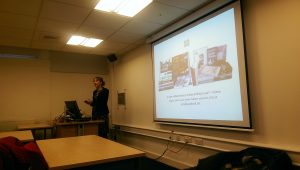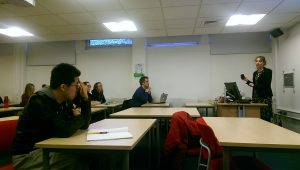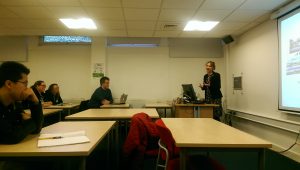
On February 11, 2016, we welcomed Sara Hunt from Saraband Books as the first visiting speaker for the MLitt in Publishing studies in the spring semester.
During its 22 years in operation, Saraband has created popular, illustrated reference, history, and arts titles with a certain amount of mindful dispirit. The Scottish publisher created a niche and built its reputation while the internet increased user access to information regardless of geographical boundaries.
For modern book publishers, gone is the cushioned marketplace of a local bookshop or library with built-in profits and tight control over the retailer’s inventory. Digital expectations have terraformed the world of publishing, so Hunt strove to articulate what she called the three N’s for navigating the shifting sands: noise, narrative and niche.
Beware Noise
Noise represents today’s consumer fatigue, resulting from such a great wealth of choice—encompassing global online ordering; immediately available downloads; unlimited range of selections; and wide array of competing forms of entertainment or use of leisure time, such as television, smart phone, game, movie, and social media. Noise makes it difficult to select works, let alone turn someone into a reader. “In the battle against noise, curation is the single biggest contribution publishers make.”
Deep discounting is a fact of life, with multinational corporations controlling conditions. Against self-publishing authors and free info, free books, global entertainment, increased costs, and lower returns, every book has to fight for itself. This can be good for readers, but can also promote complacency from publishers who can’t hear over the static, Hunt says. Fewer newer authors appear save those exciting few debuts, author maintenance drops off, fewer risks are taken, and popular success tends to be converted from or intended for another format.
Remember Narrative

The narrative keyword rephrases the old adage “content is king.” Hunt stresses the importance of appealing stories that offer more than just information. Saraband adheres to the gospel of narrative, exalting stories that are compelling, fresh, worthwhile, well-crafted, useful unusual, inspiring, well-told by a strong voice, or any combination thereof. Hunt highlighted two books that are characteristic of Saraband, Uuganaa Ramsay’s Mongol and Chitra Ramaswamy’s Expecting: The Inner Life of Pregnancy. Both books that can, with the right marketing, make their way to audiences who will value those stories.
Embrace Niche

To embrace a niche is to identify what is unique and to highlight it. Hunt points out that for many publishers, their niche—or in the case of Saraband, niches—can work like an anchor amidst all the noise. Some niches that Saraband have embraced include nature writing, memoir, wildlife, sustainable living, and Scottish literary fiction (though it’s hard to call literary fiction a niche, since Scotland is small there endures a local yearning). Publishers even have the option of utilizing an imprint to exploit or explore a niche list, as Saraband has done with their 2014-launched Contraband, which mines the crime, thriller and mystery niche. While good marketing to build readership is key, playing to one’s strengths by embracing the niche as Saraband and other successful publishers have done can provide solutions to challenges through collaboration or new publishing areas offering unique voices, easy conversion to popular digital format, or focus on high production and design values.
A room without books is a body without a soul-Cicero

According to Hunt, traditional publishers need to respond, experiment, innovate, and change. Competition with other entertainment is a challenge, but not a threat in a bad way. There is room for everybody so long as we continue to cherish high-quality writing, design, and production. Conventional book producers have already learned much from the digital side of the market, like the importance of identifying and reaching targets through influencers, hashtags, and rich metadata. Saraband continues to soldier on because Sara Hunt is always reevaluating what to publish and reconsidering how to add value, connect with target markets, and rise to the challenge presented by discounts.
Innerpeffray Library
To close out the semester, on March 22, our Publishing, Literature and Society module took a field trip to Creiff. There, we visited Scotland’s first lending library, Innerpeffray Library. Included are images of its historic facilities, idyllic grounds, and sagacious resources. Let’s consult a very old, dusty dictionary to see whether or not “sagacious” is appropriate to use here.










 2012, followed by The Busker in 2014. Both books were published by Myriad Editions, a Brighton-based publisher who focus on debut authors. Myriad is partly funded through the government, and they aim is to take a new author and establish their career. Bell stated that he chose this publisher with great care, as his first book So It Is was also his PhD thesis, and so wanted to ensure that the critical aspects of the work remained. Bell also stated the importance of face-to-face meetings with his publisher. His editorial process took around six months, and involved many different meetings with his editors.
2012, followed by The Busker in 2014. Both books were published by Myriad Editions, a Brighton-based publisher who focus on debut authors. Myriad is partly funded through the government, and they aim is to take a new author and establish their career. Bell stated that he chose this publisher with great care, as his first book So It Is was also his PhD thesis, and so wanted to ensure that the critical aspects of the work remained. Bell also stated the importance of face-to-face meetings with his publisher. His editorial process took around six months, and involved many different meetings with his editors.













